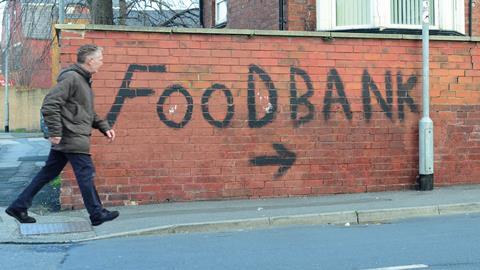As the cost-of-living crisis worsens, can lawyers and the legal system do anything to ensure a just outcome for society’s most disadvantaged people? Many are helped, Eduardo Reyes finds, yet the scale of the problem is daunting
The low down
A century ago they were described as ‘poor man’s lawyers’ – solicitors working with the country’s most disadvantaged people to seek legal solutions to their problems. The same strain of idealism led to the law centres movement 50 years later. But now, as disadvantaged people face a cost-of-living crisis that comes after more than a decade of public sector austerity, what can the overwhelmed lawyers they turn to truly offer? The legal tools available to confront poverty are, one opines, ‘very, very blunt’. Though thousands could not manage without lawyers’ help, there is a clear perception that this assistance now barely touches the sides of the problem.
‘I’ve never known it as bad in 12 years.’ That is Siobhan Taylor-Ward’s stark assessment of the need she sees on a daily basis. The Vauxhall Community and Law Centre, where Taylor-Ward advises clients on housing law, has been sitting at the heart of this part of Liverpool for 50 years, helping some families for generations. ‘They ask us for benefits advice because their mum got benefits advice here,’ she says.
One of Liverpool’s oldest areas, Vauxhall sits just north of Liverpool city centre. Once an overcrowded area dominated by slums, it was later sliced through by infrastructure developments and then, after ‘slum clearance’, neglected by civic authorities for long spells.
'They ask us for benefits advice because their mum got benefits advice here'
Siobhan Taylor-Ward, Vauxhall Community and Law Centre
More recently, though, the Liverpool Echo has described Vauxhall’s development – and potential – in breathless terms. ‘Is this Liverpool’s most up-and-coming area?’ the paper gushed in 2018, praising the area’s close-knit community.
That may be so, but the same phenomenon is driving members of that same community through the doors of the legal centre. Many in private rented accommodation have seen increases of 19%-35% in the past year, Taylor-Ward relates. That comes as the cost of food, fuel and energy rises exponentially.
Taylor-Ward assists her housing clients with income and expenditure forms, which can be requested by creditors or used in court proceedings. Often, she says, ‘they’ve spent everything on rent and energy. There’s nothing left… how on earth is this person surviving?’ What is more, ‘it feels like it’s just the beginning,’ she says – as some price hikes have ‘only just hit’.
Nationwide picture
Battle-hardened lawyers and volunteers working in law centres and advice clinics across the country tell a similar story: clients struggling with rent increases of 19% and higher in the private sector; an end to Covid protections for tenants; a rise in evictions; problems with utility bills and council tax arrears; and acute difficulty navigating a complex benefits system in the face of apparent official indifference.
‘The cost-of-living crisis will compound the underfunding of benefits over the past 10 years,’ says Jason Tetley, director of the Greater Manchester Law Centre.
'It is just getting harder and harder to offer clients any sense of hope'
Audrey Ludwig, Suffolk Law Centre
‘North Kensington, W10, has among the poorest [council] wards in London,’ John Mahoney, a legal adviser based at the Westway Trust continues. ‘People’s problems are inter-related and complex.’
Neither is the problem confined to inner cities. Audrey Ludwig, head of legal services at Suffolk Law Centre, tells the Gazette: ‘It is just getting harder and harder to offer clients any sense of hope. In rural areas we have also got real problems, with the cost of oil and gas for heating rocketing and long distances to travel to work.’
And, of course, some inner-city law centres serve the needs of a rural population in surrounding areas. ‘We are surrounded by [housing] legal aid deserts,’ Taylor-Ward notes. ‘Liverpool and Manchester pick up the slack for the north-west.’
Limited remedies
The continuing existence of law centres, through challenging years for their own funding, reflects the laudable commitment of the profession to the idea that the law can and should provide remedies to injustice for all. But the current crisis is a burden borne disproportionately by the very poorest.
‘There is an increasingly problematic “poverty premium”,’ Nimrod Ben-Cnaan, director of policy at the Law Centres Network tells the Gazette. The poorer you are, the more likely it is that you have a mobile phone that uses more expensive pay-as-you-go data, he points out, adding: ‘Prepaid energy meters are at higher tariffs than contracts, meaning homes are cold for longer, and access to public services, now primarily digital by default, is throttled.’
In the face of broad economic inequalities, what remedies can the law provide? ‘It’s a perfect storm,’ Tetley says. ‘Some of this is bigger [than a legal solution]. Law doesn’t offer a magic bullet.’
There are, he continues, ‘very, very blunt tools to confront poverty’. He uses the example of ‘section 21’ notices, the two months’ notice a landlord must give a tenant of the end of an assured shorthold tenancy – meaning eviction. ‘There is no defence as such if it is served correctly,’ he says, noting a rise in such notices where landlords intend to re-let the property at a higher rent.
Time may be bought where a section 21 notice has not been properly served. Still, ‘you are constantly holding off’, Vicky Fewkes of Ealing Law Centre observes.
Such a pause may be what a client requires in order to be placed in a better position. That may include avoiding the cost of an extra house move, Fewkes adds.
Mahoney gives the example of a client who is 65. With the retirement age for women now 67, her financial problems are compounded by the fact her housing benefit has been cut due to ‘under-occupancy’ – the so-called ‘bedroom tax’, which applies up to the state retirement age. ‘She won’t be hit by the bedroom tax once she is 67,’ Mahoney notes.
In the meantime, the aim is to secure for the client a discretionary housing payment, write to the council seeking to quash a county court judgment on the grounds it named her late husband, check her eligibility for disability benefits, and get her flat assessed for improvements by an occupational therapist from the council.
Mahoney’s work is supported by international firm Hogan Lovells, which directly funds his role. That funding means his expertise can be used to enable volunteers from the firm to help in two areas: applications for benefits; and appeals. Until the pandemic, Mahoney provided annual training sessions to the firm’s volunteers.
Staff get Helping hand
National law firm Irwin Mitchell’s cash reserves doubled in the last year to £31.8m, with its operating profit increasing 23% to £73.5m. The firm was the first to announce cost-of-living assistance for staff, acknowledging it was in a position to help where many employers are not – or do not consider such help appropriate.

The firm will this month pay most of its staff an extra £900 to help them deal with rising food and fuel costs. ‘In light of the challenging external circumstances affecting the cost of living,’ the firm said, ‘we’ve taken the decision to make a one-off payment of £900 in April’s salary to most colleagues.
‘We’re making this payment as an acknowledgement of the challenges some colleagues are currently facing from increases in the cost of living, in particular fuel and energy prices.’
Inflation rose to 7% last month. Energy firms in England, Wales and Scotland were permitted to increase bills by 54% from 1 April. More than 22m households were immediately affected, with an average increase in annual energy bills of around £700.
Hogan Lovells partner Victor Fornasier has been involved with appeals. ‘On Disability Living Allowance and Personal Independence Payments, where there is a medical assessment that has to happen, it is not thorough enough in many cases,’ he says. ‘We assist with the appeals. It is quite surprising how quickly assessments are done – 25-45 minutes. There is a lot to get through, but they always seem to be surprisingly quick.’
Many law centre lawyers and volunteers spend significant time on work where their own legal status is not needed, but their legal skills are. That includes helping clients apply for available grants. ‘We have been accessing pots of funding to give small cash grants to clients to cover electricity and so on,’ says Ludwig. ‘But those pots are drying up.’
Many grants are supposed to be ‘one-off’ emergency help. Instead, some clients need to attempt multiple applications, law centres tell the Gazette.
Accessing any source of funds that maximises income for clients in need is commonly a priority. And for many of those clients, professional support is essential. In North Kensington, Mahoney is shocked by the high levels of illiteracy, ‘yet the benefits system is digitised by default. So many have a disadvantage in an era of digitisation’.

Many working in law centres describe the multiple ways in which they take on the stresses of both clients, and the public bodies and agencies their clients must deal with.
‘The big thing making it harder for lawyers and clients has been more pressure on mental wellbeing in lockdowns,’ Taylor-Ward says. Their anxiety levels are understandably high. ‘When they have found you, someone who’ll listen, they latch on to you.’
Such clients find they are then dealing with public bodies and agencies that have their own problems. ‘It is quite obvious public bodies aren’t working properly,’ Taylor-Ward says. For immigration matters, there is ‘chaos at the Home Office’. For clients and colleagues, she says: ‘Hitting a brick wall adds to the stress. It’s getting to people.’
Mahoney confirms that ‘accessibility’ is the biggest single thing that would help vulnerable clients. He points to the example of a client who has PTSD, anxiety and depression making a call to the Department for Work and Pensions being held in a queue in two calls – the first for 70 minutes, the second for 80 minutes.
Such inaccessibility reinforces client perception of a benefits system that adds to their own anxiety, low self-esteem and sense of worthlessness. Mahoney would like to see ‘a bit of dignity and respect’ shown to clients.
Professionals calling for clients confirm these difficulties. Taylor-Ward relates the difficulty in getting a response from the Home Office. ‘We’re having to go to pre-action [letters] all the time,’ she says. And, of course, Home Office delays or poor decision-making can compound the impact of the cost-of-living rise on clients seeking to resolve their immigration status.
Close to home
Lawyers interviewed by the Gazette are candid about the strain their services are under. They expect that pressure to increase as the crisis continues and intensifies. A predicted spike in benefits appeals, for example, will not kick in until November.
Lawyers are watching enquiry numbers, as these are an indication of future demand on services. In Ealing, Fewkes notes, the centre breaks enquiries down by type, even keeping a record of areas they do not advise on. Overall enquiries rose a third in the 12 months to 31 March 2022 compared with the year before, taking the total to 1,995. Debt-related enquiries were up almost fourfold.
Still they seek to be accessible to potential clients through the locations they choose – through centres like the Westway Centre, the Vauxhall Law Centre, a presence in church halls, food banks and libraries. Referrals are taken from refugee charities, MPs, local councillors and GPs.

It should also be acknowledged that many members of the profession and law firm staff have been affected by the rise in the cost of living. National law firm Irwin Mitchell (see box) hit the headlines this month with a one-off payment to staff, citing a rise in the cost of living. Even those in relatively stable full-time employment are perceived to need help.
With the average age at qualification 29 for solicitors, many junior lawyers face long years on a challenging income while carrying high levels of debt. The charity LawCare, which supports solicitors’ mental health and wellbeing, tells the Gazette that one in 10 solicitors who contacted it for help this year related financial difficulties among their problems.
‘The cost-of-living crisis, which of course will drive up demand for law centre services, is also increasing the cost of employing people… and the cost of operating services in a crisis,’ Ben-Cnaan warns. ‘From the cost of Covid-19 testing, which the Legal Aid Agency would not cover, the cost of utilities, premises and work travel, and the cost of remaining attractive organisations to work for, we can see not just a surge in need, but a growing strain to meet it.’
- On 15 July a ‘Ride for Justice’ from Runnymede to Salisbury cathedral will raise money for law centres.
- The London Legal Walk will take place on 28 June, with walkers raising money for free frontline legal services.
- Greater Manchester Law Centre is seeking support from affiliates and volunteers.
- For more information on the Vauxhall Community and Law Centre; Ealing Law Centre; Suffolk Law Centre.





































No comments yet